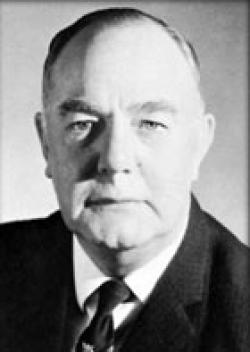
Published date
29 September 1978
On 29 September 1978, Balthazar Johannes Vorster stepped down as Prime Minster of South Africa after the holding office since 1966. John Vorster, as he became known, was a former member of the Ossewabrandwag, a South African group that supported pro-Nazi activities during World War II. He was also a member of the Nederduitse Gereformeerde Kerk (Dutch Reformed Church) and of the Broederbond, an Afrikaner secret society. In 1961, Vorster was appointed as Minister of Justice, Police, and Prisons and he used the law to vigorously suppress political opponents by deploying the police and military to restore order. In 1966, a week after the death of Hendrik Verwoerd, Vorster was appointed as the Prime Minster of South Africa.
Vorster fiercely opposed Black majority rule in South Africa and vigorously enforced the Security Legislation that curtailed anti-apartheid activities in the country. In the late 1960s, Vorster cooperated with the Rhodesian Prime Minister Ian Smith to counter the infiltration of guerrillas of the ANC-ZAPU alliance into South Africa through Zimbabwe in 1967. The ANC-ZAPU cadres aimed to find a route into South Africa by first crossing the Zambezi River from Zambia and into Zimbabwe, then marching across Zimbabwe through Wankie Game reserve, and crossing the Limpopo River into South Africa. That same year the infamous Terrorism Act was passed. This piece of legislation allowed for the indefinite detention of political activists.
In recognition to his strong commitment to the policy of apartheid, on 23 August 1968 John Vorster Square, a police headquarters in Johannesburg that became synonymous with detention, torture and death in detention was officially opened. In the wake of the 1976 student uprising, Vorster deployed troops and police leading to the detention of several youth and student activities. In April 1976, Vorster visited Israel to foster cooperation with Israel on providing nuclear energy and supplying arms to South Africa. During this time Vorster worked with Henry Kissinger the U.S. Secretary of State to persuade Smith to share power with the liberation movements in Zimbabwe, while he remained adamantly opposed to Black majority rule South Africa.
After stepping down as Prime Minister in September 1978, Vorster was made the ceremonial president of South Africa in October that same year. In November 1978, Vorster was forced to resign as president after being implicated in the Information Scandal. In the scandal, funds budgeted for defence were secretly channelled without parliamentary approval to fund the propaganda project which was designed to clean the image of South Africa. The plan involved purchasing and paying bribes to both local international news agencies such as the Washington Star newspaper and establishing a government controlled newspaper, The Citizen. Journalists of the Rand Daily Mail Mervyn Rees and Chris Day broke news on the scandal. As a consequence Vorster was forced to resign as president, ending his political career. Vorster died in Cape Town on 10 September 1983.
References
Hunter, J. (1987) Israeli Foreign Policy South Africa and Central America (Boston), p.29|
The New York Times,Treaster, J.B (1983) 'John Vorster, former South African Prime Minister, dies at 67, from The New York Times,11 September 1983 [online] Available at: www.nytimes.com [Accessed 20 September 2010]|
South African History Online, (unknown) 'Information Scandal' from South African History Online,[online] Available at: www.sahistory.org.za [Accessed 20 September 2010]